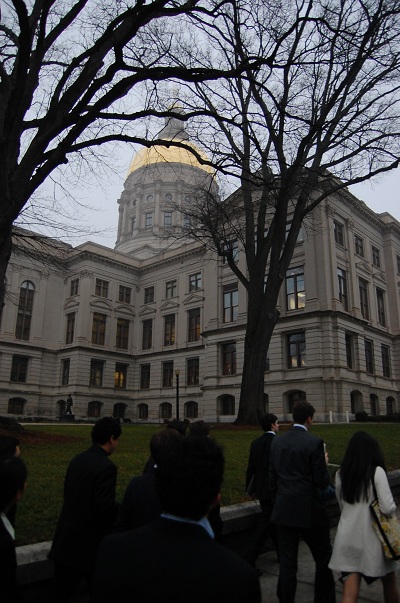On Tuesday, Feb. 1, nearly 50 students from the Institute gathered on the steps of the State Capitol to celebrate the 2011 GT Student Day at the Capitol. During this event, the SGA presented their HOPE Scholarship White Paper, with the assistance of the College Democrats at Georgia Tech and the Georgia Tech College Republicans.
Students from a variety of years and majors attended in order to meet legislators, to see the inner workings of the political process and to witness the unveiling of SGA’s White Paper.
“I’m here to fight for HOPE,” said Zachary Gardner, a first-year MGT major. “I wanted to make sure that we have a fighting chance in regards to keeping our scholarships.”
The day’s activities, coordinated by SGA, began with a reception with the students, faculty from Tech as well as members of the Senate and the House. During the reception, Kristen Greig, Student Lobby Board Chair and third-year IAML major, read the contents of the White Paper.
SGA has been working in cooperation with the Georgia Tech College Republicans and College Democrats at Georgia Tech to brainstorm some possible solutions for the large problems, specifically the continued lack of funding that surround the HOPE Scholarship.
The ideas generated were presented during the day to the State Senate in the HOPE Scholarship White Paper by Greig, SGA Director of External Affairs and third year MGT major, Elle Creel and Undergraduate Student Body President Corey T. Boone.
“The HOPE Scholarship should aim to fund 100 percent of the tuition costs for qualified students,” the document stated. “To meet the original intent of the merit scholarship, students who deserve HOPE in Ga. should not have to go into debt in order to cover tuition costs.”
A Sunday alcohol sales tax and a lottery-regulated casino are proposed to generate revenue, while a reduction in Pre-K funding, an exclusion of remedial courses from the scholarship, a limit placed on for-profit institutions and an increase in high school GPA requirements to keep the scholarship afloat have all been discussed as solutions.
The paper was presented first to students, faculty and legislators during a private morning reception, and then was presented for official resolution recognition in the State Senate by Senate Majority leader Chip Rogers. Rogers spoke to the students at the reception about what it means to be in political office and fielded questions about the State legislatures’ seeming hesitancy to address the problems surrounding the HOPE Scholarship.
“There are millions of examples of what people think we ought to do [about the HOPE Scholarship],” Rogers said. “But up here, this issue is hard to handle. Our national Congress is afraid to touch Social Security for fear of political repercussion. In Ga., the HOPE Scholarship is similar to that.”
Rogers stressed the need for a comprehensive and cohesive plan to solve the HOPE problem as soon as possible.
“[The Senate] needs to work with Governor Deal and the House in order to come together with one single plan to address this issue,” Rogers said. “We have many options and suggestions, but ultimately we must make one plan. If we cherry-pick solutions, we can really create conflict.”
Institute President G.P. “Bud” Peterson also addressed the students, faculty and legislators in regards to the issue of HOPE, as well as budgeting and financial issues. He addressed the loss of formula funding and expressed his concern over the HOPE Scholarship.
Peterson outlined the administration’s decision to continue with a six percent budgetary reduction plan for FY2011 as opposed to the four percent reduction plan once suggested by the Board of Regents.
“If we have been overly cautious, and the finances aren’t as tight as we believed, instead of asking to get money back, we can simply allocate more funding,” Peterson said. “[Tech] faces some challenges, but by no means are they catastrophic.”
Peterson also encouraged students to learn from the day’s activities, and to remember the ultimate purpose of government.
“Democracy is a marvelous thing,” Peterson said, “but it doesn’t work unless we are participatory.”
